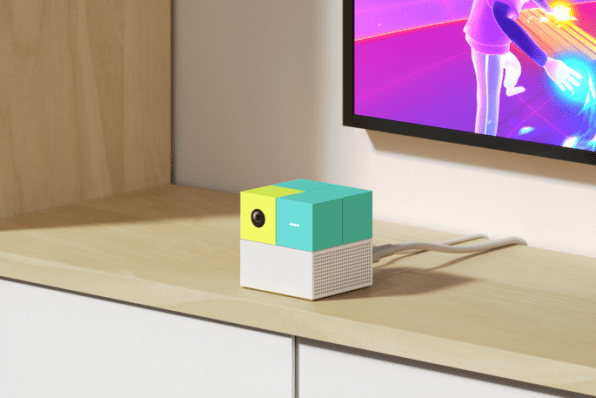Bay Area-based computer vision startup Nex believes the future of TV is all about getting children (and their parents) off the couch.
Last year, the company released the Nex Playground, a colorful set-top game console for children 8 years and younger with an integrated camera that captures a player’s motions to control gameplay. “Modern entertainment options have made families more sedentary, more isolated from each other,” says Nex cofounder and CEO David Lee. “We want to change that.”
Titles available on the device include a tennis game that makes you move back and forth to serve balls, a Hula-Hoop game featuring popular children’s character Peppa Pig, an interactive fitness class, and a rhythm game called Starry that’s similar to the popular VR game Beat Saber, albeit without the need to wear a headset—or a controller, for that matter. Nex Playground tracks motion solely with its camera, which makes playing along a lot easier for younger children.

“We’re not doing hardcore gaming,” says Lee. “We designed from the ground up for a family audience.” And Nex has been able to strike partnerships with some big names in family entertainment. After signing a licensing deal with Hasbro last year, the company brought Sesame Workshop on board as a partner in February. It plans to bring motion games starring characters like Elmo and Cookie Monster to the device in the coming months.
The idea to track motion for video games is not new: Microsoft began selling a motion sensor accessory dubbed the Kinect for its Xbox game console in 2010, but stopped selling the device seven years later, citing a lack of interest from high-end game developers. That hasn’t deterred Lee, who calls Nex Playground “a spiritual successor” to the Kinect and points out that Microsoft’s device sold 35 million units—making it one of the fastest-selling consumer electronics devices at the time.
There are also a few differences between the two devices. The Kinect included an infrared projector and a depth sensor to accurately track the position of players in the room. Nex, on the other hand, relies on advances in computer vision and AI to do the same with just one single camera. That approach also allows Nex to make the device smarter over time; the company has plans to add object detection in the future, and allow children to incorporate everyday objects into their gameplay. “With computer vision, we can actually transform a toy into a smart toy that can have some interaction with the system,” says Lee.
Martin Scott, a research director at the consulting firm Analysys Mason, says Nex Playground is also a throwback to Nintendo’s Wii and its more active style of gaming. “Eighteen years have passed since the Wii launched,” says Scott, “and many of the late millennials and early Gen Z kids who grew up playing those family games now have children of their own. There’s a nostalgic element to these kinds of games, for this cohort of buyers, that Nex can tap into.”
The big question is: Are families interested enough in motion-driven video games to pay $200 for another device? And, more significantly, will they accept a camera in their living room?

TV manufacturers have for some time played with the idea of adding cameras to their television sets. However, fearing a privacy backlash that could threaten their core business, companies such as Sony and Samsung have opted to make TV cameras an optional accessory as opposed to a part of the TV itself. And a pandemic-inspired push to bring Zoom and other video-chat products to the TV screen has largely fallen flat—a dedicated Zoom app for Sony smart TVs has been downloaded just over 10,000 times, according to Google Play Store data. Zoom’s app for Android phones has surpassed one billion downloads.
Lee is not surprised. “I use video conferencing every day,” he says. “But I use it through my laptop, through my phone.” Asking people to pay a few hundred dollars for yet another camera is an uphill battle if all it offers is bringing their existing video chats to a bigger screen. “You need to give a reason for the camera to exist,” Lee says. “You need to create an experience that people desire.”
Physical camera shutters are key to assuaging people’s surveillance anxieties. Nex’s Playground ships with a small magnet clip that can cover its camera when not in use. The company is also processing all data on the device itself, which Lee touts as another boon for privacy. “We’re not sending your video to the cloud,” he says.
Even with those safeguards in place, Analysys Mason’s Scott is cautious about Nex’s odds. “There’s definitely a market for family-centric motion gaming, but that market is niche,” he says. “Is this a killer app for smart TV sets? Probably not.”
Lee and his team, on the other hand, are eager to find out how far they can take motion gaming. Nex has thus far sold a modest first batch of a few thousand Playground devices through its website, and is now in the process of taking orders for its second production run. The company also plans to expand to e-commerce sites like Amazon, and eventually even be in physical retail locations.
At the same time, Nex is also striking partnerships with TV makers and others to integrate its tech and games into their devices. Nex games are already available on a TV-connected camera sold by U.K. pay-TV provider Sky, as well as on Telly, an ad-supported TV that is being given away to consumers for free.
Over time, Lee envisions Playground as something of a flagship device for Nex, similar to Google making its own phones, but also licensing its operating system to bigger phone manufacturers. “We want to build something that pushes the industry forward,” he says.
Autentifică-te pentru a adăuga comentarii
Alte posturi din acest grup


On a typical day, you can’t turn on the news without hearing someone say that Congress is broken.


When news broke that the United Healthcare CEO was shot in broad daylight early last month, outrage erupted online. But it wasn’t aimed at the assassin. Instead, it was directed at the broken U.S.

Ashley Abramson first came across Sophie Cress in a cold pitch to her work email. Cress was asking to be an expert source for any stories Abramson was working on as a freelance reporter. “I’ve got

Threads, Meta’s X and Bluesky rival, is testing ads with certain brands in the United States and Japan, the company said Friday.
“We know there will be plenty of feedback abo

Sooner or later, the politicians who most admire Donald Trump begin to emulate him. They
